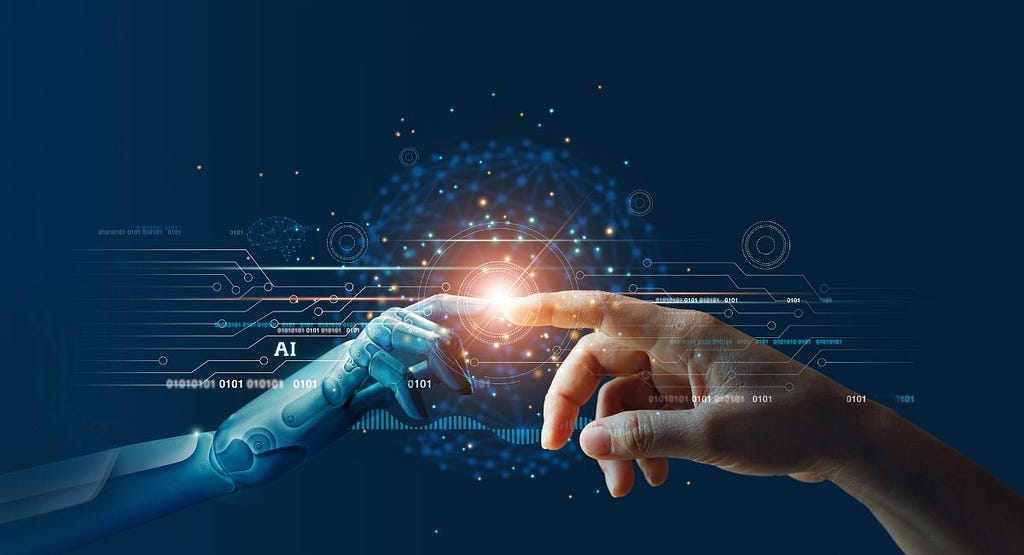
The convergence of Blockchain and Artificial Intelligence (AI) is reshaping how businesses operate, offering innovative solutions that enhance efficiency, security, and transparency. This blog explores the synergies between these two powerful technologies, illustrating their potential to create smarter solutions for enterprises.
Understanding Blockchain and AI
Blockchain is a decentralized digital ledger technology that records transactions across multiple computers in a way that ensures the registered data cannot be altered retroactively. This feature provides a high level of security and transparency, making it ideal for applications requiring trust and accountability. Each block in the chain contains a list of transactions, and once a block is filled, it is added to the chain in a linear, chronological order. This immutability makes Blockchain particularly valuable in industries where data integrity is paramount.
Artificial Intelligence, on the other hand, refers to the simulation of human intelligence in machines programmed to think and learn like humans. AI excels at processing vast amounts of data, identifying patterns, and making predictions. By utilizing machine learning algorithms and neural networks, AI systems can analyze complex datasets to derive insights that inform decision-making processes. This capability is especially beneficial for businesses looking to gain a competitive edge through data-driven strategies.
The Intersection of Blockchain and AI
The integration of Blockchain and AI creates a robust framework that addresses various challenges faced by enterprises today. Here are some key areas where their combination proves beneficial:
1. Data Integrity and Security
One of the primary concerns in AI applications is the integrity of the data used for training models. Blockchain provides a transparent and immutable record of data transactions, ensuring that the information fed into AI systems is accurate and trustworthy. By storing data on a Blockchain, organizations can verify its authenticity at any point in time. This integration helps alleviate issues related to data tampering and enhances the reliability of AI outputs.
For example, in sectors like finance or healthcare, where data accuracy is crucial for compliance and operational effectiveness, using Blockchain can help maintain an unalterable history of transactions or patient records. This ensures that AI algorithms have access to reliable datasets, leading to better-informed decisions based on accurate information.
2. Enhanced Decision-Making
AI’s ability to analyze large datasets can be significantly improved with the secure data storage capabilities of Blockchain. By utilizing Blockchain, businesses can ensure that their AI models are trained on high-quality data, leading to better predictions and insights. For instance, in financial services, AI algorithms can analyze market trends while Blockchain secures transaction history, enabling more informed investment decisions.
Moreover, this integration allows for real-time analytics where businesses can respond quickly to market changes or operational challenges. The combination of AI’s predictive capabilities with Blockchain’s secure data management means that companies can make proactive decisions rather than reactive ones.
3. Operational Efficiency
The combination of Blockchain and AI can streamline business processes by automating routine tasks. Smart contracts — self-executing contracts with terms directly written into code — can utilize AI to trigger actions based on predefined conditions without human intervention. This automation reduces operational costs and increases overall efficiency across various sectors such as supply chain management and logistics.
In supply chain management, for instance, smart contracts can automatically execute payments when goods are delivered as per agreed terms recorded on the Blockchain. Meanwhile, AI can analyze shipping patterns to optimize routes or predict delays based on historical data. This synergy not only saves time but also minimizes human error in operations.
4. Transparency in Operations
Blockchain’s inherent transparency complements AI’s decision-making processes by providing a clear audit trail of actions taken by AI systems. This transparency allows businesses to track how decisions are made, fostering trust among stakeholders. In sectors like healthcare or finance, this can be particularly crucial as it ensures compliance with regulations while maintaining confidentiality.
For example, in healthcare, using Blockchain to store patient records allows clinicians to access complete patient histories securely while ensuring that patients have control over who accesses their information. At the same time, AI can analyze this data for better diagnostic tools or treatment recommendations without compromising patient privacy.
Use Cases of Blockchain and AI Integration
The practical applications of integrating Blockchain with AI are vast and span various industries:
Supply Chain Management
In supply chain management, combining these technologies allows companies to achieve real-time tracking of goods from production to delivery while using AI for predictive analytics to optimize inventory levels. By recording every transaction on a Blockchain, businesses gain visibility into their supply chains that was previously unattainable. For instance, companies can track the provenance of products — ensuring authenticity and ethical sourcing — while using AI algorithms to predict demand fluctuations based on historical sales data.
Healthcare
In healthcare, secure sharing of patient records through Blockchain enhances privacy while AI analyzes this data for better diagnostic tools. By utilizing Blockchain technology to store medical records securely, healthcare providers can ensure patient confidentiality while enabling authorized personnel access to critical information when needed. Simultaneously, AI can process this vast amount of medical data to identify trends or assist in diagnosing conditions more accurately than traditional methods.
Financial Services
In financial services, integrating these technologies allows for automated compliance checks and fraud detection through machine learning algorithms operating on secure transaction histories stored on a Blockchain. Financial institutions can use AI to monitor transactions in real time for suspicious activity while relying on the immutable nature of Blockchain records for audit trails during investigations.
Future Prospects
The future looks bright for the integration of Blockchain and AI as businesses continue to seek innovative solutions to enhance operational efficiency while reducing costs and improving security. According to industry forecasts, the market for combined Blockchain and AI solutions is expected to exceed $703 million by 2025. As more organizations recognize the potential benefits these technologies offer — such as improved accuracy in decision-making processes and enhanced customer experiences — the adoption rates are likely to accelerate.
Furthermore, as regulatory frameworks evolve around both technologies, enterprises will find more structured pathways for implementation that align with compliance requirements while maximizing operational benefits.
Conclusion
The synergy between Blockchain and Artificial Intelligence holds immense potential for enterprises looking to innovate their operations. By ensuring data integrity through secure storage methods provided by Blockchain technology while harnessing the analytical power of AI for better decision-making processes, this integration paves the way for smarter business solutions.
For businesses considering adopting these technologies or seeking guidance on implementation strategies, partnering with an experienced Blockchain development company like Codezeros can provide valuable insights and support tailored to your specific needs.
This blog aims to provide a comprehensive overview of how Blockchain and AI are working together to create smarter solutions for enterprises. By understanding these technologies’ potential benefits and practical applications, businesses can better position themselves in an increasingly digital landscape while staying ahead of their competition.
How Blockchain and AI are Creating Smarter Solutions for Enterprises was originally published in Coinmonks on Medium, where people are continuing the conversation by highlighting and responding to this story.








